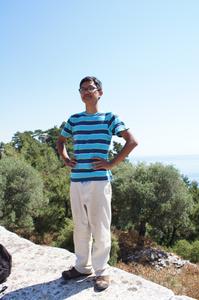Splash Biography
DUC NGUYEN, Psychologist and Neuroscientist
|
Major: Psychology / Neuroscience College/Employer: Princeton Year of Graduation: 2017 |

|
Brief Biographical Sketch:
I'm a current junior in the psychology department / neuroscience institute, and I am particular interested in the neurobiological systems of learning in the brain (ask me about my research; fair warning: it's pretty dense!). I love teaching in a wide range of topics and areas, and I'm excited to share these ideas with you all. In my spare time, I enjoy reading abstract philosophical arguments, cooking international foods, and taking walks in the cool spring air. Past Classes(Clicking a class title will bring you to the course's section of the corresponding course catalog)H324: Philosophy as a Way of Life in Splash Spring 16 (Apr. 30, 2016)
Many people regard philosophy as an irrelevant enterprise to modern life, reserved only for those individuals with their heads too far in the clouds and too much free time. Modern academic philosophers, with their large emphasis on the production of ideas intended only for their fellow academic philosophers, can often seem far removed from everyday life. More than two thousand years ago, however, in both the East and the West, philosophers were not concerned with producing complex arguments only among themselves, but instead were primarily interested in the attainment of truth and wisdom for the purpose of instigating a transformation of both themselves and their lives. As French philosopher Pierre Hadot once commented, modern philosophers are artists of reason, but ancient philosophers were artists of life. In this primer course in philosophy, we will investigate the principle ideas of some of the world’s most influential philosophers, ancient, pre-modern, and modern, as we attempt to construct how their philosophies may offer us guidance and solace as we attempt to live in the modern world.
S325: Positive Psychology: The Science of Happiness and a Fulfilled Life in Splash Spring 16 (Apr. 30, 2016)
For much of its relatively short history, the psychological sciences have been heavily focused on what is wrong with people, from Sigmund Freud’s ideas of mental disorders to Stanley Milgram’s obedience studies. Then emerged positive psychology, which began to use the scientific method to systematically study the “well-lived life” and how people can use this understanding to achieve happiness and satisfaction. Now, positive psychology is a thriving and exciting new branch of psychology with almost immediate implications for how we live, act, and think. As a primer for the new field, this course will explore how scientists define and study happiness and satisfaction, some of the not-so-surprising and surprising findings so far, and how we can incorporate some of these ideas and theories into our own lives.
S256: Positive Psychology: The Science of Happiness and a Fulfilled Life in Splash Spring 15 (Apr. 25, 2015)
For much of its relatively short history, the psychological sciences have been heavily focused on what is wrong with people, from Sigmund Freud’s ideas of mental disorders to Stanley Milgram’s obedience studies. Then emerged positive psychology, which began to use the scientific method to systematically study the “well-lived life” and how people can use this understanding to achieve happiness and satisfaction. Now, positive psychology is a thriving and exciting new branch of psychology with almost immediate implications for how we live, act, and think. As a primer for the new field, this course will explore how scientists define and study happiness and satisfaction, some of the not-so-surprising and surprising findings so far, and how we can incorporate some of these ideas and theories into our own lives.
|
|
